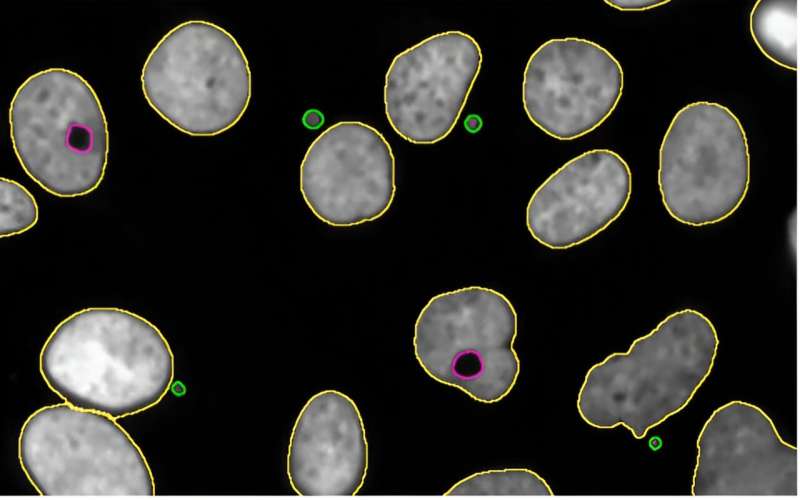This article has been reviewed according to Science X's editorial process and policies. Editors have highlighted the following attributes while ensuring the content's credibility:
fact-checked
peer-reviewed publication
trusted source
proofread
New bioinformatics tool to identify chromosomal alterations in tumor cells

A team of the University of Barcelona and the Biomedical Research Institute of Barcelona (IRB Barcelona) has designed a new bioinformatics tool to identify the chromosomal alterations that are characteristic of cancer cells.
This new detection system, known as QATS (QuAntification of Toroidal nuclei in biological imageS), is a computational biological imaging processing tool that will contribute to improving tumor research and classification through its ability to automatically identify and quantify the phenotypes associated with chromosomal instability in the nuclei of cancer cells.
The study, "QATS: an ImageJ plugin for the quantification of toroidal nuclei in biological images," is published in the journal Bioinformatics.
Identifying chromosomal changes in cancer cells
Chromosomal instability is common in solid tumors, and it is linked to both the start and the progression of cancer and the metastasis of cancer cells. This phenomenon, caused by changes in the number and structure of chromosomes during cell division, can induce changes in the DNA and affect the entire cellular machinery. Moreover, chromosomal instability not only favors tumor origin and progression, but also enhances intra-tumor heterogeneity and resistance to anti-tumor treatments.
Cancer cells can survive with high levels of chromosomal instability. The new QATS tool is a predictive system that will help to identify and quantify the toroidal nuclei—new biomarkers of chromosomal instability—in biological images.
"Toroidal nuclei are phenotypically different from normal nuclei, since these present a ring shape and a void with cytosolic material. In the field of research, these have been recently characterized as important biomarkers of chromosomal instability, and they represent an innovative pathway to understand and fight cancer," notes Professor Caroline Mauvezin, from the UB's Department of Biomedicine.
"Traditionally, the level of chromosomal instability in cancer cells has only been assessed by quantifying micronuclei, which are irregular structures derived from the cell nucleus that may contain chromosomes or chromosomal fragments," she adds.
"Therefore, integrating the strategy to assess toroidal nuclei into research and clinical practice has immense potential for tumor stratification and the design of patient-specific treatments," says Carles Pons, member of the Structural Bioinformatics and Network Biology Laboratory at IRB Barcelona.
Currently, the QATS system has shown its efficiency in identifying and quantifying toroidal nuclei in preclinical studies of cancer cell lines. "In the future, the application of QATS in more complex biological scenarios—human tissue samples from patient biopsies—will represent a breakthrough for the scientific and medical communities to improve cancer diagnosis and patient treatment," conclude the authors.
The QATS program is available online: www.toroidalnucleus.org.
More information: Carles Pons et al, QATS: an ImageJ plugin for the quantification of toroidal nuclei in biological images, Bioinformatics (2024). DOI: 10.1093/bioinformatics/btae026



















